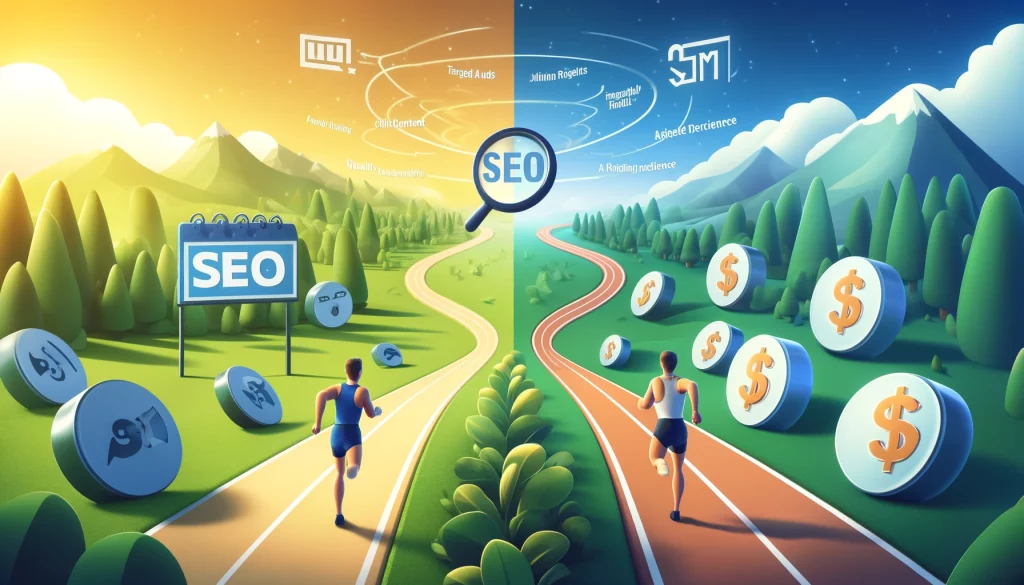SEO vs SEM: Undestanding Search Marketing
Search marketing is an important channel for a business aiming to thrive in this economy. It encompasses two primary pillars:...

Search marketing is an important channel for a business aiming to thrive in this economy. It encompasses two primary pillars: Search Engine Optimization (SEO) and Search Engine Marketing (SEM).
Understanding the nuances of these approaches is crucial for leveraging their potential effectively.
SEO: The Marathon Runner
SEO stands for Search Engine Optimization, and it refers to the practice of optimizing your website to rank higher in organic search engine results. Organic search results are the listings that appear on a search engine results page (SERP) based on the relevance and quality of the content on your website, as determined by search engine algorithms.
SEO is like running a marathon. It’s all about long-term gains and sustainable growth. When you invest in SEO, you’re optimizing your website to rank higher in organic search results, which doesn’t involve paying for placement. Here’s why SEO is essential:
- Cost-Effective: Unlike paid ads, SEO focuses on earning traffic organically. It requires an initial investment in time and resources, but the long-term benefits are substantial and sustainable.
- Credibility and Trust: High organic rankings signal to users that your website is a trusted authority. Search engines like Google prioritize websites with quality content, relevant keywords, and good user experience.
- Evergreen Content: SEO efforts compound over time. Quality content that ranks well can continue to drive traffic for years without additional costs.
- User Experience: SEO isn’t just about search engines; it’s about improving user experience too. Faster load times, mobile-friendly design, and valuable content all contribute to higher rankings and better user satisfaction.
SEM: The Sprinter

SEM, on the other hand, stands for Search Engine Marketing, and it refers to the practice of using paid advertising to improve your visibility in search engine results. This includes things like pay-per-click (PPC) advertising, where you pay to have your ad appear at the top of search results for specific keywords, and display advertising, where your ads appear on other websites that are part of a search engine’s advertising network.
SEM is akin to sprinting. It’s about getting quick, targeted results through paid advertising. Here’s why SEM can be a game-changer:
- Immediate Visibility: With SEM, your ads can appear at the top of search results almost instantly. This is perfect for new businesses or those launching a new product.
- Targeted Advertising: SEM allows for precise targeting. You can choose who sees your ads based on factors like location, demographics, and search behavior, ensuring your budget is spent on high-potential leads.
- Measurable ROI: With SEM, every click is trackable. You can measure the effectiveness of your campaigns in real-time, making it easier to tweak strategies and optimize for better performance.
- Competitive Edge: In highly competitive markets, SEM can help you outrank competitors by bidding on high-value keywords and securing top ad positions.
The goal of SEM is to increase the quantity and quality of traffic to your website by targeting specific keywords and demographics with paid advertising. This can be a faster and more targeted way to drive traffic to your website than SEO, but it can also be more expensive.
SEO vs SEM
Here is a table summarizing the differences betwen SEO and SEM
| SEO (Search Engine Optimization) | SEM (Search Engine Marketing) |
|---|---|
| SEO is the process of optimizing a website to rank higher in organic search engine results. | SEM is the process of using paid advertising to increase visibility in search engine results pages (SERPs). |
| SEO involves optimizing a website’s content, structure, and metadata to make it more appealing to search engines. | SEM involves creating and managing paid search campaigns using tools like Google Ads or Bing Ads. |
| SEO focuses on improving the quality and relevance of a website’s content to attract more organic traffic from search engines. | SEM focuses on bidding on relevant keywords and targeting specific audiences to drive traffic to a website. |
| SEO is a long-term strategy that requires consistent effort and ongoing optimization to see results. | SEM can provide immediate results, but requires ongoing investment to maintain visibility in search results. |
| SEO is a cost-effective way to drive organic traffic to a website over time. | SEM can be more expensive than SEO, but offers greater control over targeting and visibility in search results. |
| SEO is focused on improving the user experience and providing valuable content to website visitors. | SEM is focused on driving traffic to a website and optimizing ad campaigns for maximum ROI. |
Invest in SEO or SEM?
To summarize, SEO and SEM are two different search marketing approaches to improving your online visibility. SEO focuses on optimizing your website to rank higher in organic search results, while SEM leverages paid advertising to target specific keywords and demographics. Both strategies are effective for driving traffic, but they require different skills and resources to implement successfully.
For a business to achieve sustainable long-term growth, it’s essential to invest in all marketing channels including channels like social media, referrals and affilates. For young companies, starting with SEM is a smart move to reach economic viability quickly.
As you generate revenue and have more funds, you can then invest in building an in-house SEO team or partnering with an SEO agency to establish a strong organic presence. This integrated approach ensures immediate gains and sets the foundation for lasting success.
Explore More Content
Table of Content

